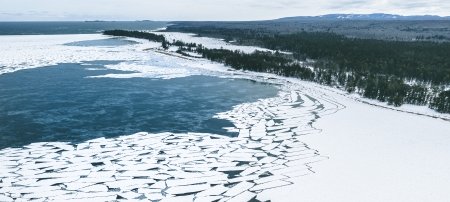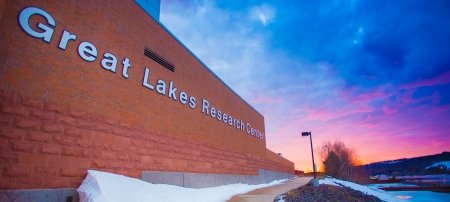Timothy Havens is the new director of the Great Lakes Research Center.
Timothy Havens came to Michigan Technological University as an electrical and computer engineering researcher. As of January 1, he’s now the director of the Great Lakes Research Center (GLRC), in addition to continuing his roles as director of the Institute of Computing and Cybersystems (ICC) and the William and Gloria Jackson Professor in Computer Science. Havens succeeds outgoing GLRC director Andrew Barnard.
“I am extremely pleased that Tim has stepped up and accepted the directorship of the Great Lakes Research Center,” said Dave Reed, Michigan Tech’s Vice President for Research. “Tim has been a very effective leader of the Institute of Computing and Cybersystems for several years and I am confident he will bring that experience and approach to the GLRC.”
We recently sat down with Havens to discuss the future of the GLRC and his role at Michigan Tech.
“The GLRC is striving to become the premier research institution on campus, both in terms of the excellence in research being performed and also in the support that GLRC staff bring to campus researchers. The faculty and staff and their diverse research are at the top of their fields.”

Q: Why were you selected as the next GLRC director?
TH: My experience in being a researcher and research administrator plays well with being the director of the GLRC. I’m currently the director of the ICC and was the associate dean of research for the College of Computing, with both units seeing significant growth during my leadership. One of our goals in the ICC has been to grow into a sustainable, self-supporting unit with excellent support for our researchers, often using the GLRC as an example. We have made significant strides toward this goal, recently hiring a full-time assistant director for research development. I’m excited I now get the chance to lead the center we’ve been using as a role model.
Q: Your previous research has been focused on computing and cybersystems. What does that have to do with Great Lakes research?
TH: To be a successful research administrator, one needs to be a strong researcher but not necessarily in any particular area. My experience allows me to come into the directorship with the high-level view necessary to leverage resources in creative ways, such as new vessels and research platforms, next-generation computing and professional personnel. Research centers are businesses, and the aspects of balancing people, infrastructure and resources are mostly the same, no matter the research focus.
That said, I do Great Lakes research. I’ve worked with the U.S. Navy for several years, developing signal processing for detecting objects under and on the water and ice using acoustics. The connection of my research to the GLRC is more on the techy side, but I’m cognizant of and strongly support all of the center’s research; and I’m really thrilled to learn more about the areas I haven’t yet had direct connections with. Furthermore, I look forward to connecting my land-based robotics research to the GLRC: marine autonomy, smart ships and the Marine Autonomy Research Site.
Q: What do you do in your work?
TH: I lead the Pattern Recognition and Intelligent Machines Engineering lab. For many years I’ve been working with the Department of Defense and industry partners on tough sensing problems. For example, detecting explosive hazards, developing AI that can predict vehicle malfunctions well before a check engine light turns on, and how to make robots more robust to sensor malfunctions or malfeasance, to name a few.
In my research I’m investigating how to pull information out when useful data are hidden behind the noise. I take those data and turn them into decisions — “You should probably take your car in to check its transmission within the next 1,000 miles,” for example.
Q: How does your work relate to the other research at the GLRC?
TH: Machine learning is applicable nearly everywhere. I take data and create implicit models that can make decisions with those data: predictions, assessments, diagnostics, etc. Dr. Pengfei Xue and I have already started talking about how we can combine my AI research with his hydrodynamic models, enabling either better or more efficient predictions about key indicators of climate change in the Great Lakes. When I boil down what I love about research, it’s that I love to solve puzzles — there are tons of challenging and important puzzles to solve with GLRC researchers and I look forward to the collaborations.
Q: What is your vision for the future of the GLRC?
TH: We should certainly think about expanding our building! The GLRC is striving to become the premier research institution on campus, both in terms of the excellence in research being performed and also in the support that GLRC staff bring to campus researchers. The faculty and staff and their diverse research are at the top of their fields. The center will not only continue to push the envelope about what can be learned about Great Lakes and coastal oceans systems, but also look for opportunities in the uncharted waters of complex, real-world problems that require multiple-disciplinary approaches to resolve.
Michigan Technological University is an R1 public research university founded in 1885 in Houghton, and is home to nearly 7,500 students from more than 60 countries around the world. Consistently ranked among the best universities in the country for return on investment, Michigan's flagship technological university offers more than 120 undergraduate and graduate degree programs in science and technology, engineering, computing, forestry, business, health professions, humanities, mathematics, social sciences, and the arts. The rural campus is situated just miles from Lake Superior in Michigan's Upper Peninsula, offering year-round opportunities for outdoor adventure.







Comments